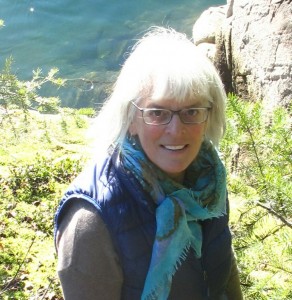Renowned writer, researcher, and advocate of natural history,
Eileen Delehanty Pearkes
“It’s not possible to know the present and to explore future possibilities without understanding well the terrain of the past.” from work-in-progress, A River Captured
Day: March 19th, 2015 Venue: UNC Ballroom Time: 2:00PM
UBCO is proud to welcome Eileen Delehanty Pearkes to our campus this year on March 19th. She will be featured as our guest speaker directly following the Celebratory Water Ceremony at 2:00pm in the UNC Ballroom. As a public speaker, Eileen’s work focuses on the upper Columbia River region in British Columbia, Canada. Does hydro-electric power live up to its status as a “green” form of energy with neutral or minimal ecosystem impacts compared with fossil fuels? A close look at the Columbia River Treaty (CRT) between the U.S. and Canada and its impact in southeastern B.C. will reveal a surprising answer. The 1961 CRT required Canada to provide water storage in four reservoirs that upended the ecosystems and natural hydraulic patterns of several river valleys overnight, destroyed agricultural land, inundated archaeological sites and displaced more than 2300 people from homes and communities. The cost-benefit analysis used by treaty authors provided a narrow framework for decision-making that had no way of measuring non-human values (fish, terrestrial habitat, riparian forests) or the losses to ranchers, to local food security and to sustainable logging over many decades. The sixty-year anniversary of the treaty signing (2024) will provide a once-in-a-generation opportunity to restructure how we value and use water in the B.C. Interior. What will sustainability look like under a revised treaty?
More recent talks:
Learning from Our Past, a trans-boundary conference on the Columbia River Treaty, Spokane, Washington, October 2014; Future of Our Salmon, a conference on salmon restoration to the Columbia in Portland, Oregon, April 2014; Ethics and the Columbia River Treaty: righting historic wrongs; 4th Annual International Columbia River Symposium, Poulson, Montana, October 2012; American Water Resources Association AGM, Ellensburg, Washington, September 2012; Selkirk College MIR Centre for Peace, September, 2011; 2nd Annual International Columbia River Symposium, Kimberly, B.C., October 2011; local respondent at presentation on water given by Robert Sandford in Nelson, B.C., October 2011; Touchstones Nelson Museum of Art and History, November, 2011 – a lecture on fur trade explorer David Thompson.
Her books and essays include…
The Geography of Memory (Kutenai House Press, 2002, second printing 2010); Heart of the River (pb&j press, 2004); The Inner Green (Maa Press, 2005), River of Memory (edited by William D. Layman; UBC Press, 2006) and The Glass Seed (Timeless Books, 2007). Several essays have been published by Canada’s national newspaper, The Globe & Mail. Anthologies include Going Some Place (Coteau Books, 2000) and Facts and Arguments, Selected Essays from the Globe & Mail (2002). From 2002-2009, she wrote for the award-winning yoga magazine ascent, with an essay anthologized in Inspired Lives, the best of real life yoga from ascent magazine (timeless books: 2005). She was also invited to contribute to both The Purcell Suite (2007), and Seasonings (2010), two books that help to realize the value of local culture.

